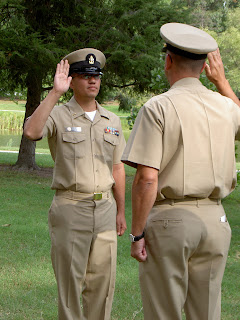Copyright Words and Image © 2011 by Ralph Couey
*Johnstown, PA Tribune-Democrat
September 25, 2011
as "Hail to the Chiefs"
Every year, the United States Navy selects a deserving few First Class Petty Officers for advancement to Chief Petty Officer. The magnitude of this achievement cannot be overstated.
In Navy culture, the Chief occupies a special place. Of all the ranks, from Seaman Recruit to Admiral, none is more respected and revered.
Chiefs are the technical experts within their rating or specialty. But the rank goes way beyond expertise. A sailor has more direct contact with the Chief than any other person in the chain of command. Thus, no other person has a more direct or powerful influence over their life and career. The tasks performed on a daily basis are assigned by the Chief. An individual’s work is monitored and measured under the eyes of the Chief. But the Chief is also primarily responsible for the sailor's morale, health, welfare, and training, making sure they are technically competent and ready for advancement when the time comes.
But most importantly, the Chief is the one person whom sailors must trust absolutely, the one they know will come to their aid in times of trouble; the one person who will hold them accountable, but won't abandon them. This is the key element in the life of a young sailor far from the safety net of home and family. In their wisdom and leadership, Chiefs are that steadying influence in an often chaotic life.
Because of their position, Chiefs are set apart by a different uniform, different berthing, and even separate clubs on base. In every aspect of Navy life, the line between the junior enlisted ranks and the Chief Petty Officers is clearly drawn.
The Navy is rigidly structured and often hopelessly bureaucratic. It is a harsh existence, consisting of long hours, high stress, and difficult work. It is a system slow to reward, yet quick to punish. And yet, it is in those harsh fires where the steel of leadership is formed and the tradition of honor is passed along. Youngsters who were barely trusted with the family car are now adults responsible for the maintenance and operation of complex and dangerous systems that cost tens of millions of dollars. And yet they do it everyday, led by the cadre of khaki-clad old salts who have lived the life, navigated its rocks and shoals, and haven't forgotten what it was like to be away from home for the first time.
Leadership is never about the leader. Leadership is about the organization, how to improve it and the people within. Thus, the organization’s laurels are how the leader is known. A leader may be a manager, but a manager isn’t necessarily a leader.
Young people who join the military have left home, family, and friends for the first time. From day one, they are thrust into an utterly alien environment; an existence regimented beyond anything in their experience. They're pushed to discover their true capabilities. The pace is relentless, and the standards high and unbending. One finds out quickly that individual actions have consequences for the entire group.
There are reasons for this. Most young people are self indulgent and must learn to think of others first. The sailor must be taught that the group is more important that the individual and the mission is more important than the group. If there are shipmates who are struggling, you don’t leave them behind. You encourage and support them. This is why friendships from the military last for lifetimes.
Politicians are often referred to as "our elected leaders." But far too often, we discover that their idea of public service is actually a thinly-veiled cover for selfish interests. One could argue that such an attitude is less a personal failure than survival in a corrupt environment. But great leaders rise above the system instead of surrendering to it.
In my life, I've known ordinary leaders, and some bad ones. I’ve also known a few exceptional ones, men and women who earned my respect. Their example showed that a leader cannot command respect. They must earn it.
A small percentage of sailors make Chief because the standards are high. Each one who earns those anchors learns that the corps of Chief Petty Officers is only as strong as each individual chooses to be.
John Quincy Adams once said, "If your actions inspire others to dream more, learn more, do more, and become more, then you are a leader."
It is the standard by which we should measure all who desire to lead.

No comments:
Post a Comment